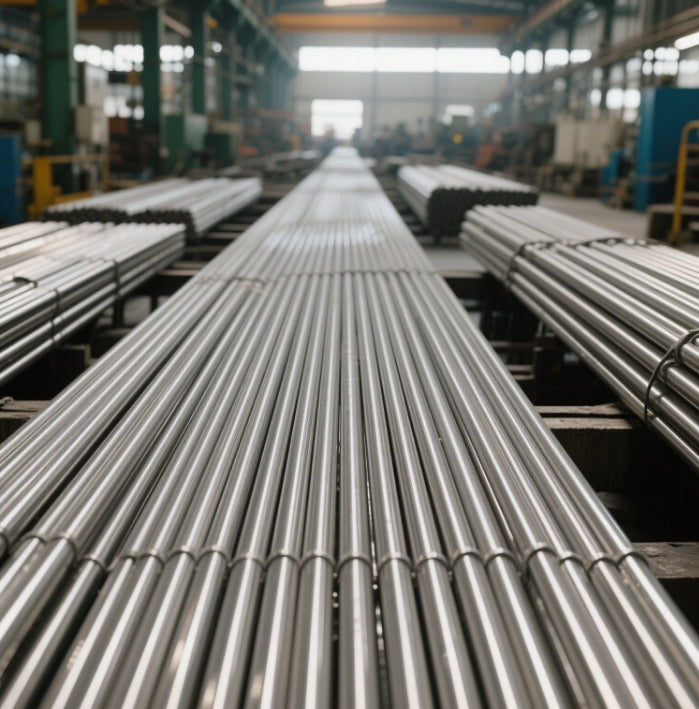StockSteel
Precision-Cut Stainless Steel Rod | ANSI/AISI Certified
Precision-Cut Stainless Steel Rod | ANSI/AISI Certified
Couldn't load pickup availability
Precision-Cut Stainless Steel Rod | ANSI/AISI Certified
Product Specifications
Our stainless steel tig rod and welding rod for stainless steel are precision-engineered to meet ANSI/AISI standards, ensuring exceptional performance in industrial, marine, and construction applications. Below are the detailed specifications:
| Property | Details |
|---|---|
| Material Grades | 304, 316, 309, 410 (ANSI/AISI-certified) |
| Hardness (Rockwell) | 304: B80-B95; 316: B85-B100; 309: B90-B105; 410: C25-C40 |
| Diameter Range | 1/4 stainless steel rod (6.35mm) to 6" (150mm) |
| Length | Standard: 3m, 6m; Custom lengths available (up to 12m) |
| Surface Finish | Polished, Cold Drawn, Hot Rolled, Annealed, Precision Ground |
| Tolerance | ±0.03mm (precision-ground rods) |
| Temperature Range | -200°C to 800°C (grade-dependent) |
Key Properties & Manufacturing Process
Crafted using advanced CNC machining and controlled heat treatments (quenching, tempering, and precipitation hardening), our stainless steel rods deliver unmatched mechanical properties. Key attributes include:
- Tensile Strength:
- 304/316: 515–860 MPa (ideal for structural and marine applications).
- 309: 620–860 MPa (optimized for high-temperature welding).
- 410: 480–1,720 MPa (heat-treated for extreme durability).
- Bending Strength: Resists deformation under load, with yield strengths ranging from 210 MPa (annealed 304) to 1,050 MPa (cold-worked 316).
Identification & Marking
Each stainless steel rod is traceable to its production batch and compliant with global standards:
- AISI/SAE Codes: Laser-etched grade labels (e.g., 316L, 309L).
- ISO Standards: Chemical composition markings (e.g., X2CrNiMo17-12-2 for 316L).
- Batch Numbers: Aligned with ASTM A276 (bars) and AWS A5.9 (welding rods).
Weight Calculation
Calculate the weight of a 1/4 stainless steel rod or other sizes using the formula:
Example: A 1/4" (6.35mm) diameter, 3m-long 316 rod weighs approximately 0.75 kg.
Why Does Stainless Steel Rust?
While stainless steel is corrosion-resistant, certain conditions can compromise its integrity:
- Chloride Exposure: Saltwater, bleach, or industrial chemicals degrade the chromium oxide layer.
- Low Chromium Content: Grades with <10.5% chromium (e.g., 410) lack sufficient passivation.
- Galvanic Corrosion: Contact with carbon steel or aluminum accelerates oxidation.
- High-Temperature Oxidation: Prolonged exposure above 800°C causes scaling and embrittlement.
- Surface Contamination: Iron particles from tools or grinding induce localized pitting.
To mitigate rust, use nitric acid passivation or electropolishing to restore the protective oxide layer.
Applications
- Stainless Steel Tig Rod: Ideal for TIG welding in aerospace, food processing, and chemical industries.
- Welding Rod for Stainless Steel: Ensures strong, corrosion-resistant joints in pipelines and structural frameworks.
- Industrial Machinery: Shafts, valves, and hydraulic components requiring precision and durability.
- Architecture: Decorative railings, load-bearing beams, and coastal infrastructure.
Why Choose Our Stainless Steel Rods?
- ANSI/AISI Certification: Guaranteed compliance with international quality standards.
- Precision Engineering: ±0.03mm tolerance for critical applications.
- Corrosion Resistance: Optimized chromium-nickel ratios for harsh environments.
- Custom Solutions: Tailored dimensions, finishes, and alloys (e.g., 309 for high-heat zones).
- Global Logistics: 7–15-day lead time with air/sea freight options.
Why Us?
- 20+ Years of Expertise: Specializing in high-performance alloys for extreme environments.
- Sustainability Focus: Recyclable materials and low-energy production.
- 24/7 Technical Support: Guidance on alloy selection, fabrication, and maintenance.
- Competitive Pricing: Cost-effective solutions without compromising durability

